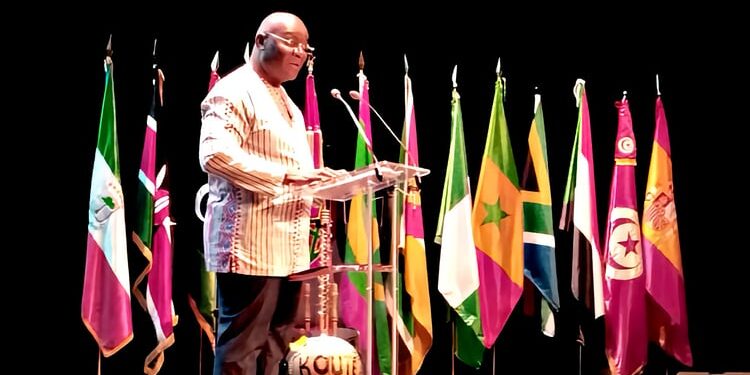Alberto Rubio
2024 is the Year of Education of the African Union (AU) and, as explained by the Ambassador of Gabon and dean of the African Heads of Mission in Spain, Patrick Moukala, “aims to mobilise governments” to achieve the vision of ‘Education for All’ contained in the 2063 Agenda and the Sustainable Development Goals of the United Nations.
During the celebration in Madrid of the 61st anniversary of the founding of the AU’s predecessor – the Organisation of African Unity (OAU) – the ambassador insisted that education is of “vital importance, not only for the future of Africa, but also for the future of the world”, as the continent is home to one billion people, 400 million of whom are between 15 and 35 years old.
The data provided by the dean of African ambassadors on the level of education on the continent are worrying: one in four children of school age does not attend school on the African continent; nine out of 10 children in sub-Saharan Africa cannot read or understand a simple text at the age of 10; and the out-of-school population in Africa, particularly south of the Sahara, increased by 12 million up to 2021.
For this reason, Moukala recalled the speech by the President of the African Union, Mohamed Boul Sheikh el Gaswani, in which he “called for investment in education to enable all our young people to contribute to Africa’s development, stressing the importance of supporting the education system, promoting innovation and research and creating employment opportunities for young people”.
“Africa has no doubt that the Kingdom of Spain, in the framework of its new strategy for the continent, will play an important role in the training of African youth”, he said, “facilitating access for young Africans to some of its 84 public universities as well as its vocational and technical training centres”.
For his part, the Secretary of State for Foreign Affairs, Diego Martínez Belío, agreed that “education will be one of the axes and priorities that we will establish in our strategy for the coming years”, in response to the words of the Gabonese ambassador.
Martínez Belío added that “today, Spain is strongly committed to Africa” and gave as an example the extraordinary contribution of 50 million euros to the African Union, recently announced by Minister José Manuel Albares, “accompanied by an additional 20 million for the development of Africa”.
“The partnership between Spain and Africa is a strategic necessity for Africa, for Spain and for Europe“, added the Secretary of State who, in the first five months of 2024, has travelled to Nigeria, Ghana, Ivory Coast, South Africa, Mozambique and Mali. He said he plans to visit the rest of the continent.
“We aspire to develop, in collaboration with our partners and friends in the region, a space of stability and prosperity in this vast geographical area”, he continued, and therefore announced the government’s objective of achieving “a more intense Euro-African concertation” that will be embodied in the Summit of the Future, next September, as well as in the 4th Global Conference on Financing for Development, to be held in Spain in 2025.
He also said that “we will soon present a new strategic framework for our relations with Africa“, in which the key words will be “partnership and collaboration, based on mutual respect and dialogue between equals”.
Finally, he proposed to the ambassadors in attendance the search for “joint solutions to global challenges, such as climate change or digital transformation, and the construction of peace“. In this regard, he referred to Ukraine – where he condemned ‘Russian aggression’ – and the Middle East, in which case he justified the recent recognition of the State of Palestine as “an indispensable step towards a two-state solution and the definitive search for peace”.
The Ministry of Foreign Affairs, Casa Africa, the organisation Women for Africa and the NGO Mercy Ships Spain, among others, received recognition at the end of the event for their commitment to the African continent. Afterwards, the guests enjoyed a wide range of gastronomic delicacies provided by all the participating countries.














